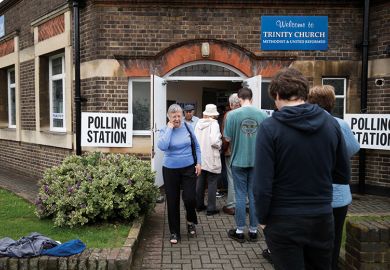“Expanding higher education made sense for a few decades in the latter part of the 20th…and early 21st century, but that time is now past.” So runs one of the central arguments of David Goodhart’s recently published book, Head Hand Heart: The Struggle for Dignity and Status in the 21st Century.
The book contends that over recent decades in many Western nations, particularly the UK and US, higher education expansion has produced a “graduate cognitive class” (“head” workers) and diminished the status of manual and care workers (“hand” and “heart” workers). And “a democratic society that wants to avoid a powerful undercurrent of resentment must…provide meaning and respect for people who cannot – or do not want to – achieve in the examination room and professional career market”, it says.
Plenty have argued that too many people go to university. But the depth and nature of Mr Goodhart’s argument – contending that higher education expansion has sucked prestige from vocational education and life from the sort of deindustrialised towns that delivered victory for the Conservatives in last year’s UK general election – could provide the philosophical map for a Tory government already on manoeuvres in such territory.
Higher education expansion was “rational” when professional and managerial classes were expanding, but has now become a “serious problem” in economic, political and cultural terms, said Mr Goodhart, founding editor of Prospect magazine, now head of the right-wing Policy Exchange thinktank’s demography, immigration and integration unit.
An influential figure described as having been “on the winning side of successive ideological battles over the last 25 years”, he told Times Higher Education: “The idea of a successful life has become far too narrowly focused on doing well at school, going to a good university and getting a decent cognitive-professional job. We’ve created a single ladder into this zone of safety and success.”
Mr Goodhart said that his position on higher education “is rather caricatured by people like [former Tory universities minister] David Willetts…Not surprisingly, because David helped to create the bloody thing.”
That refers to Lord Willetts’ highly critical review of Head Hand Heart. The peer objected to Mr Goodhart’s diagnosis of a “brain drain” from deprived towns into university cities by observing that such towns have higher education participation rates well below the national average, suggesting that their problems were “more likely to result from there being too little access to a university education there rather than too much”.
Given deep social inequalities in England, isn’t cutting higher education participation inevitably going to mean university for the more advantaged and further education for the less advantaged?
“Not necessarily,” replied Mr Goodhart. “That depends on the prior issue of whether people are getting a decent basic [school] education or not. People with the…aptitude and ability should go [to university]. But I think the hurdle should be set higher.”
He added of higher education expansion: “To continue doing something really stupid – economically, culturally and politically – because we are an unequal society, and will continue to be an unequal society, just seems to be a stupid logic.”
Mr Goodhart argued that towns such as Rotherham and Mansfield lost their brightest young people to cities with universities, exacerbating “grotesque” regional inequalities. “We’re sucking the brains out of these places,” he added.
There’s an argument that high-status vocational education systems such as Germany’s – which Mr Goodhart admires – benefit from being alongside university systems with relatively flat social and reputational hierarchies, meaning there are no “elite” university graduates to monopolise prestige in the eyes of employers. But Mr Goodhart is not advancing that argument.
“Parity of esteem [for vocational education] is just a ridiculous idea – it’s never going to happen,” he said. “Because the pinnacle of our society will, and should be, the very, very brightest people who go to Oxford and Cambridge and Imperial and whatever.”
The problem, he argued, was that “below the thin layer of the top of our education machine we have produced a bulge of people [graduates] who are, on average, no more particularly able than the people who don’t go to university”.
Doesn’t the loss of status among non-graduates mainly stem from economic choices made by governments since the 1980s – on deindustrialisation and consequent loss of decent manual jobs – rather than from education policy?
Mr Goodhart rejected that. “Our education policy is still operating as if we were the economy of 30 years ago,” he said.
He continued: “AI is going to sweep away a lot of the middle- and lower-level cognitive jobs – in law, in medicine, in accountancy…Yet we’re still churning out – and Willetts [wants] to go on churning out – more and more people with dysfunctional cognitive qualifications.”
Register to continue
Why register?
- Registration is free and only takes a moment
- Once registered, you can read 3 articles a month
- Sign up for our newsletter
Subscribe
Or subscribe for unlimited access to:
- Unlimited access to news, views, insights & reviews
- Digital editions
- Digital access to THE’s university and college rankings analysis
Already registered or a current subscriber?








